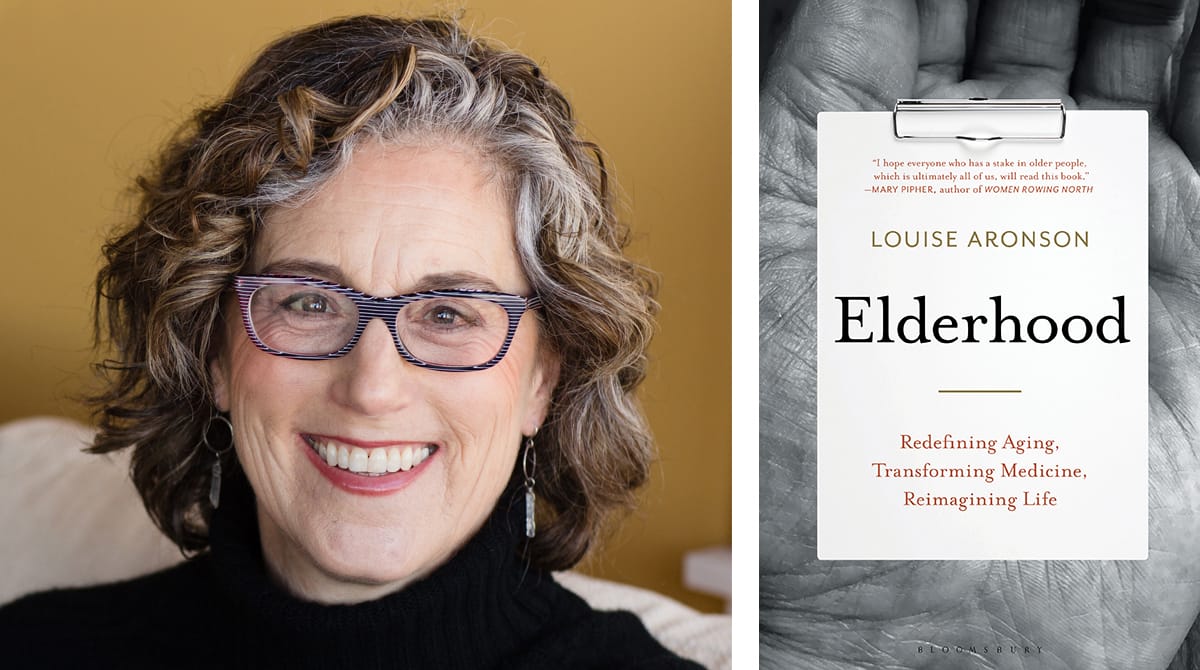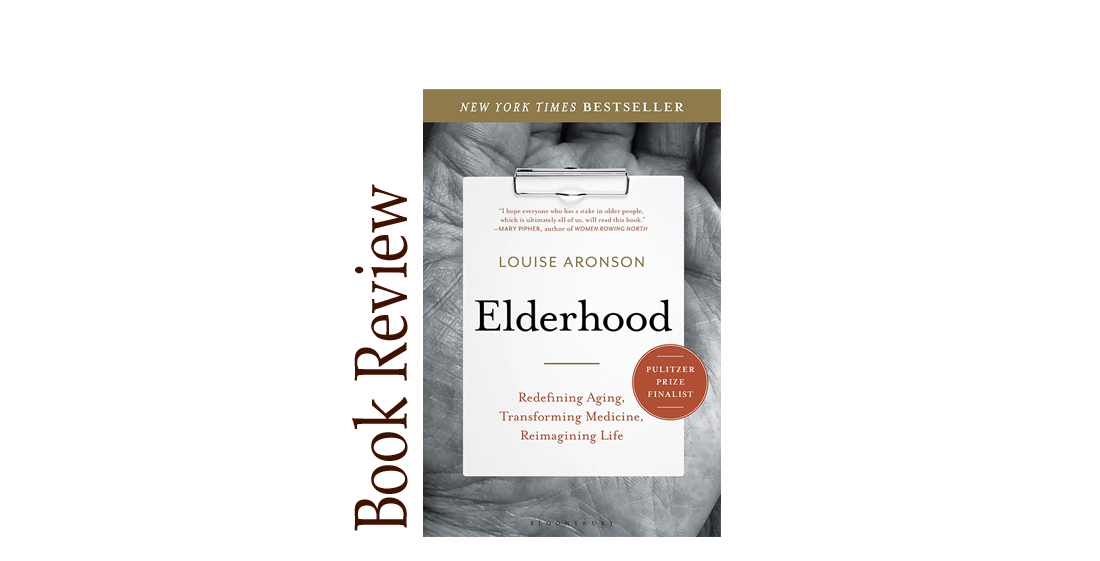- Date Published:
2019 - Length:
464 pages—Listening Time: 18 hrs, 22 minutes - Genre:
Non-Fiction, Memoir, Self-Help - Setting:
Primarily in the United States, Contemporary - Awards:
Pulitzer Prize Finalist General Non-Fiction 2020; Andrew Carnegie Medals for Excellence in Fiction and Nonfiction Longlist Nonfiction 2020; Golden Poppy Book Award Shortlist Non-Fiction 2019; Notable Books List Nonfiction 2020; Chicago Public Library Best of the Best: Adults 2019 - Language:
English - Sensitive Aspects
Ageism, medicalization of aging, depiction of mistreatment and neglect, social devaluations and stereotypes, end-of-life care, hospice critique, cultural and social disrespect - Recommend for Book Club:
Yes, everyone over the age of 60 should read this book

Anyone can benefit from reading Elderhood: Redefining Aging, Transforming Medicine, Reimagining Life by Louise Aronson since no one is immune to the effects of aging. Likewise, anyone now employed in the medical industry would do well to read this book and consider how they fit within the context she paints. Aronson does an impressive job of explaining the aging process and how the US healthcare system got to the point where the elderly are treated like medical issues first and then like human beings second, if at all. Is the term "caring" no longer relevant as the medical world seeks solutions to the problems caused by aging bodies? Given the sheer size and rate of aging in our population, it is essential that these kinds of things change sooner rather than later.
Frankly, I decided to read this book first because it was a Pulitzer Prize finalist and second because I, along with most followers of Readers With Wrinkles, fall into the "elderhood" category. I figure that we should all garner as much information as possible to face our later years with enthusiasm, joy, and hope.
I can't say that this book is as entertaining as reading a good historical fiction or murder mystery, but Aronson delivers the masses of material in such an engaging and personable manner that I was completely engaged and anxious to find out what she disclosed on each page. My husband got a little tired of my "telling him all about it" as I shared each new "nugget" of knowledge I discovered while reading it. He finally agreed to read the book himself, perhaps in hopes that it would encourage me to stop bothering him. But, after all, he may be taking care of me some day, right? He needs to know this stuff.
Again, I think that everyone would benefit from the information shared in this book. Reading this book made me feel excited about the prospect of getting older. I wish every doctor was like Louise Aronson.


Louise Aronson’s Elderhood: Redefining Aging, Transforming Medicine, Reimagining Life is a comprehensive and empathetic exploration of aging, challenging prevailing societal and medical attitudes toward old age. Drawing on her extensive experience as a geriatrician, Aronson weaves together personal anecdotes, patient stories, research, and cultural analysis to advocate for a profound rethinking of how we perceive and treat the elderly.
Aronson argues that “elderhood” is a vital, distinct, and often lengthy stage of life, comparable to childhood and adulthood. With people living longer than ever, many will spend decades as elders, yet society continues to view old age primarily as a period of decline and disease, a time when individuals are essentially waiting to die.
The book critiques the medical system’s tendency to treat aging as a pathology rather than a natural phase. Aronson highlights how ageism and the lack of geriatric training among healthcare providers lead to misdiagnosis, overtreatment, and neglect of older adults’ wishes and dignity.
Aronson blends memoir with broader analysis, recounting her journey from medical student to geriatrician. She illustrates systemic failures through patient vignettes and her own experiences, exposing how the healthcare system often prioritizes cure over care, especially at the end of life.
The book draws from history, anthropology, literature, and public health to examine the roots of ageism and the marginalization of elders. Aronson calls for a cultural shift to recognize the value, diversity, and potential for meaning in elderhood. Aronson suggests practical reforms in medicine and society, including better training for physicians, more nuanced distinctions among stages of old age, and a greater focus on listening to and respecting elders’ preferences. She advocates for seeing elders as individuals with unique experiences and needs, rather than a homogenous group.
Both society and the healthcare system often fail the elderly, largely due to systemic ageism and inadequate medical education on geriatrics. Old age should not be viewed as a monolithic decline; there is vast diversity among elders, and many live vibrant, meaningful lives well into advanced age.
Successful aging is rooted in adaptability, self-acceptance, and finding meaning in the later stages of life, rather than resisting or denying aging itself. Aronson’s vision is neither utopian nor bleak; she acknowledges the frustrations and challenges of aging but also highlights its joys, wonders, and opportunities for growth.
Elderhood is both a call to action and a compassionate reimagining of what it means to grow old. Aronson urges readers—whether elders themselves, caregivers, or healthcare professionals—to recognize the value of elderhood and to work toward a society that honors and supports people at every stage of life.

Reading Elderhood by Louise Aronson will provide you with a richer, more compassionate understanding of aging, challenge your assumptions about what it means to grow old, and equip you to advocate for a more just and humane approach to elder care. Here are more specific reasons to read this book.
A Transformative Perspective on Aging
Elderhood challenges the common narrative that old age is merely a time of decline and burden. Louise Aronson, drawing on over 25 years as a geriatrician, reframes elderhood as a distinct, valuable, and even celebratory phase of life, rich with potential for growth, learning, and contribution. The book encourages readers to recognize aging as a natural and enriching process, not something to be feared or hidden, and advocates for dismantling the cultural biases and ageism that marginalize older adults.
Insightful Critique of Medicine and Society
Aronson provides a deeply informed critique of how the medical system and society at large often fail older adults, sharing moving stories of misdiagnosis, neglect, and the consequences of depersonalized care. She draws on personal experience and case studies to emphasize the need to provide more compassionate, individualized, and holistic care for elders, making the book essential reading for anyone navigating, or expecting to navigate, the healthcare system as they age.
Empathy, Storytelling, and Personal Narrative
The narrative is enriched by Aronson’s own journey as a doctor, her family’s experiences with aging, and the stories of her patients. This blend of memoir, medical insight, and social commentary creates a compelling and humanistic portrait of later life. Aronson’s empathetic and often emotionally moving writing invites readers to reflect on their own attitudes toward aging, offering both sobering realities and moments of optimism and insight.
Practical and Societal Relevance
The book addresses practical issues such as the evolving nature of work and retirement, the importance of age-friendly communities, and the need for policies that support older adults in remaining engaged and valued. Aronson also explores the psychological, emotional, and social dimensions of elderhood, providing a nuanced understanding that is relevant for individuals, families, caregivers, and professionals alike.
Critical Acclaim and Accessibility
Elderhood is a New York Times bestseller and Pulitzer Prize finalist, widely praised for its compassionate, philosophical, and accessible approach to a challenging subject. While the book does not shy away from the difficulties of aging, it ultimately offers a sense of optimism and empowerment, painting a fuller, more humane picture of what elderhood can be.
Who Should Read This Book?
This book is for
- anyone interested in understanding or preparing for the realities of aging—whether for themselves, their loved ones, or the patients they care for—should take note.
- healthcare professionals, caregivers, and policymakers seeking a deeper, more empathetic grasp of elder care.
- readers who appreciate narrative nonfiction that combines memoir, medical insight, and social critique.


If you appreciated Elderhood: Redefining Aging, Transforming Medicine, Reimagining Life by Louise Aronson for its blend of personal narrative, medical insight, and societal critique on aging, here are several other books that offer similarly thoughtful explorations of aging, ageism, and the experience of growing older.
- Being Mortal: Medicine and What Matters in the End by Atul Gawande: This widely acclaimed book examines how medicine can better serve people as they age and face end-of-life decisions. Like Elderhood, it combines medical expertise with moving stories and advocates for a more humane, patient-centered approach to aging and dying.
- This Chair Rocks: A Manifesto Against Ageism by Ashton Applewhite: A spirited and evidence-based call to challenge societal stereotypes about aging, this book addresses the roots and consequences of ageism and encourages readers to embrace the aging process.
- Women Rowing North: Navigating Life’s Currents and Flourishing as We Age by Mary Pipher: Focusing on women in their later years, Pipher explores the challenges and joys of aging, drawing on interviews and research to offer guidance on how to age with resilience and grace.
- Knocking on Heaven’s Door: The Path to a Better Way of Death by Katy Butler: This memoir blends personal experience with investigative reporting to examine how modern medicine approaches death and dying and how families can advocate for more compassionate care at the end of life.
- Somewhere Towards the End by Diana Athill: A candid and literary memoir reflecting on the realities and rewards of old age, Athill’s book is praised for its honesty and insight into the later stages of life.
- Can’t We Talk About Something More Pleasant? by Roz Chast: This graphic memoir uses humor and poignancy to depict the challenges of caring for aging parents, offering a unique perspective on family, aging, and mortality.
- No Time to Spare: Thinking About What Matters by Ursula K. Le Guin: A collection of essays from the acclaimed author, reflecting on aging, creativity, and the everyday moments that matter in later life.
- Essays After Eighty by Donald Hall: A poet’s perspective on life in his eighties, this collection is both meditative and sharp, exploring the realities of aging with wit and clarity.
- On Call: A Doctor’s Journey in Public Service by Anthony Fauci: Although it primarily focuses on public health and medicine, readers of Elderhood may find value in the memoir’s reflections on a lifetime spent in medicine and public service.
- The Little Old Lady Who Broke All the Rules by Catharina Ingelman-Sundberg: For those interested in a lighter, fictional take on aging, this humorous novel follows a group of elderly friends rebelling against the limitations of their retirement home.
- Three Things About Elsie by Joanna Cannon: A gentle, character-driven novel about memory, friendship, and the experience of aging in a care home.


Comments